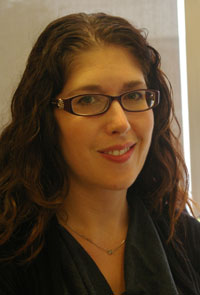Tricia Carmichael wishes people could stop assuming the worst when they hear about chemicals.
“Chemicals are not a bad thing,” says the associate professor in Chemistry and Biochemistry. “There are 300 different naturally occurring chemicals in an apple, but people don’t like the word ‘chemicals’ because it evokes something in their mind that can be very negative.”
2011 is the International Year of Chemistry and to showcase all the good things chemicals and the people who work them do to improve our lives, a number of Carmichael’s colleagues will be at Devonshire Mall this Friday. Visitors will get to meet scientists and hear about their research, learn about graduate and undergraduate programs, see a presentation on “green chemistry” and even watch a chemistry magic show. The event should be a good opportunity to dispel some myths about chemistry, said Dr. Carmichael.
“Most people usually have a very stereotypical view of scientists,” she said. “It’s usually someone in a lab coat, beakers everywhere, everything bubbling … For many of us, it’s not like that at all.”
Carmichael has been at UWindsor for six years, but used to work as research scientist in flat panel display  fabrication at IBM, examining cost effective methods of manufacturing such items as computer monitors and television screens. Later, she moved in to organic electronics, where she worked with such carbon-based materials as pentacene, examining ways they could replace silicon as semiconductors and transistors.
fabrication at IBM, examining cost effective methods of manufacturing such items as computer monitors and television screens. Later, she moved in to organic electronics, where she worked with such carbon-based materials as pentacene, examining ways they could replace silicon as semiconductors and transistors.
Now she works in the exciting field of flexible and molecular electronics. She studies methods for aligning molecules on certain surfaces so data can be transferred through them. Her aim is to provide the know-how needed for nanotechnologists to make display screens that can stretch, roll and wrap.
“You can picture what kind of a difference it would make in daily life,” she said. “We all have cell phones. What if you could roll them up?”
It’s technology that could be used to make flexible, electronic wallpaper: imagine papering the walls of your office and changing it whenever you felt with a few simple keystrokes, just like you can with your computer monitor. But it also has more serious application potential, especially in the field of medical diagnostics, where researchers are developing epidermal electronics, stretchy devices that could be attached to the skin to test for such defects as heart disease, rather than using bulky monitors.
“These are all things that are coming,” she said. “You can go on line and look at prototypes, but we’re doing the kind of research that will make it happen.”
The event is set for Friday, October 14 from 10 a.m. to 9 p.m. Displays will be set up in the mall outside the Bay store.

